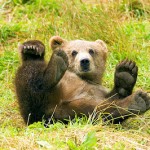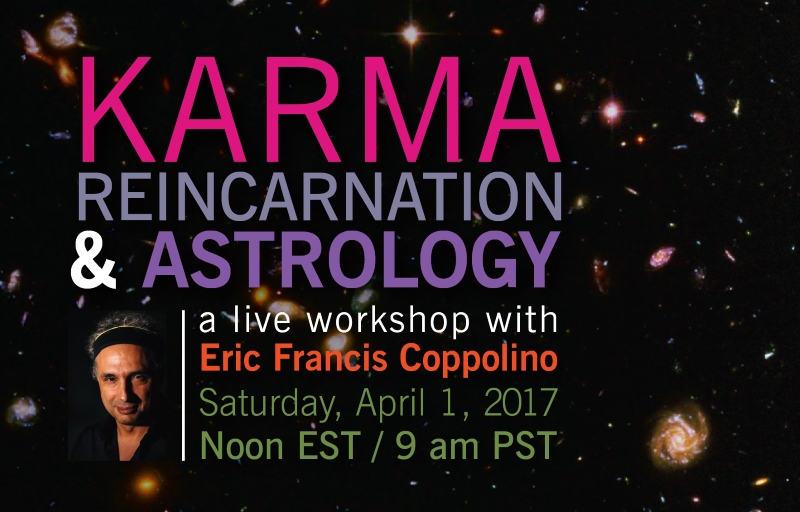“Late in the night, I seemed to commune with entities of pure thought, beaming a message at me. Their words hovered in my mind, then scattered away. I retrieved my notebook and scrawled them down before they vanished from my memory. ‘You go deeper into the Physical to get to the Infinite.’”
— Daniel Pinchbeck; 2012: The Return of Quetzalcoatl
Our time has many names, including New Age, Aquarian Age, Information Age and Computer Age. Those all sound positive. However, in other circles our time is known as Kali Yuga: the Age of Quarrel and Conflict, or the Iron Age. Whatever we call it, our time seems to be a Coming of Age age.

Brown bear (Ursus arctos) having fun; photo by Beverly & Pack via flickr, under a Creative Commons license.
Change is rapid and constant. We seem to be moving toward something positive, but that is paradoxically opposed by the Holocene Age of Extinction, otherwise known as the sixth great extinction, which many anthropologists and other scientists say is the current age.
The Holocene is also known as the Age of Man. In other words, the Age of Extinction is the Age of Man.
But it does not have to be that way. We can tip the scales in our favor and move away from the Age of Man toward the Age of Universal Man, or Homo universalis, as Barbara Marx Hubbard says. This is an age of conscious evolution rather than conscious extinction. We can start this move by realizing that not only do we lose a species in extinction, we lose its voice, its language, its way to communicate and its connection with the universe. That language is not only a gift from the Creator/Creatrix to that species, it is also a gift to us, as we learn how each species perceives and interacts with the world. To learn, we have to listen.
Some human language originated from sounds heard in nature, onomatopoeic sources: an ongoing orchestration of natural sound and vibration, especially from animals. Language will not evolve in the way it can when we no longer hear such sounds. I heard this in a catbird’s song one morning as I walked along Winter Ouzel Creek near my home. When birds and whales and frogs and crickets sing with all they’ve got, despite all that goes on around them, I sense how much they are doing to maintain the purity and evolution of the planet simply with their song.
As biologist E.O. Wilson asks, “Do we really want to live on a planet where one species cannot leave half of it for the other 8.9 million species?”
If we can leave half the planet intact, we may yet shape-shift into what don Oscar Miro-Quesada recommends: “…rather than being a dominating species we become an altruistic, interdependent presence within the great web of life.” This type of human presence can reverse the Holocene Age of Extinction and create the Age of Universal Man. This is to what the term “world reversal” refers. This is our choice.
Animal sounds became shamanic songs to call in animal allies — from this world and beyond — but these relationships are being lost through extinction. And it’s not just sounds; plants, animals, fungi and human cultures are leaving, along with their language, gifts, perceptions and wisdom. So we are left with less understanding of the natural world and a lessened opportunity to understand it because the orchestra is not complete. We originated within a symphony, but are forced to live in a cacophony.
As the natural world becomes less diverse, so does the human world. Both are less communicative, knowledgeable, wise and beautiful, as strands of the web of life are cut and dangle without connection. Rather than orchestrate repair by reflecting natural processes in how we support ourselves and evolve, we engage in biological book-burning and censorship, heralding not just a Silent Spring, but a Silent Millennium. Is this really the legacy we want to leave as the Age of Man?
Right now, much of the natural world hides from us, afraid we will find it. Beauty. Species. Sound. Going…going…almost gone. The thing is, Gaia’s magnificent creatures and creations do not want to leave the planet. They don’t want to exist just in the ethers. They want to live here, with us.
Fortunately, the planet still loves us as one of her own; but the reciprocity and decisions of the natural world are becoming like ours, based on fear rather than love. You see, there is a difference between Mother Earth/Gaia and the world. Gaia contains the world, but her consciousness is distinct from, although connected to, everything that lives here. This is why it is imperative we connect with both the Planet and the natural world, and listen to each while living our lives. Otherwise, while Mother Earth will try to support us, nothing else that lives here will. If this happens, our odds of surviving are going…going…too.
Some human behaviorists suggest we are attracted to beauty because we equate beauty with health. Beauty is a transformational and inspirational vibration. As the beauty and the diversity of life on our planet diminish, we don’t have beauty available to us to transcend and transform our consciousness. Without a foundation of natural beauty, it’s harder for us to recover once we get knocked down, so we stay stuck and we stay down. For sustenance, we prey on each other instead of praying with each other. Relatively speaking, things not in balance require more to subsist than those in balance.
The natural world of creative growth and evolution is orchestrated through the mantras of our animal allies and compadres. That is what a consistent nature song is, a mantra. They are beautiful and sacred sounds used as an object of concentration, and they embody some aspect of spiritual power. There is not just a predator-prey relationship; we seem to have reduced the natural world to that, being the reductionists we are. Natural world relationships are a shape-shifting cosmology of energy and consciousness through an evolutionary flow through consciousness. To experience this may be why we’re here.
We walk into the unknown every step of the way. This means the unknown is something with which we should be intimately familiar. Through planetary preservation we enter into sacred and appreciative relationship with the seen and unseen worlds that maintain life and foster conscious evolution. From awareness to connection, from connection to expansion and from expansion to a higher vibration — right relationship may lead to a quantum jump to greater and clearer manifestation from the love and joy of being and becoming. I suspect that right relationship will be appreciated and reciprocated in higher vibrational experiences, so it makes sense to learn it and practice it here.
There is no doubt that physical reality is a demanding, but beautiful, place. Earth is our mystery school. Here we experience cause and effect, and learn how to manifest desire in sacred relationship within sacred space. Were we to be placed in a space where manifestation of desire happens effortlessly without first learning to be responsible with this power, god/goddess only knows what we would do.
So maybe the Creator/Creatrix knows what he/she is doing after all, by testing us here. By choosing conscious evolution, an Age of Universal Man can become the time and space to remember our source, history and creative and loving power and how to use them. If we can effectively and compassionately manifest on the earth plane — by all accounts the most difficult plane of all — the joy and freedom awaiting us in more etheric realms must truly be remarkable. But first we have to know the joy and freedom that is here now. A Holocene Age won’t serve any of us.
Steve Guettermann is a freelance writer and “teaches” critical thinking at Montana State University. He is currently studying Peruvian shamanism under don Oscar Miro-Quesada, and published an article in last year’s Planet Waves annual edition, Vision Quest. Steve’s email is migratoryanimal@gmail.com; you can also visit his website.



“in other circles our time is known as Kali Yuga: the Age of Quarrel and Conflict, or the Iron Age.”
Ahhhhh, now i get it!!!!! Hadnt heard this before. OK, no more queries 😉
… to loose 1 (one) species is to loose, unsuspectedly, our original tongue.
FullMoon blessings everyone 🙂
I think you are absolutely correct, Linda.